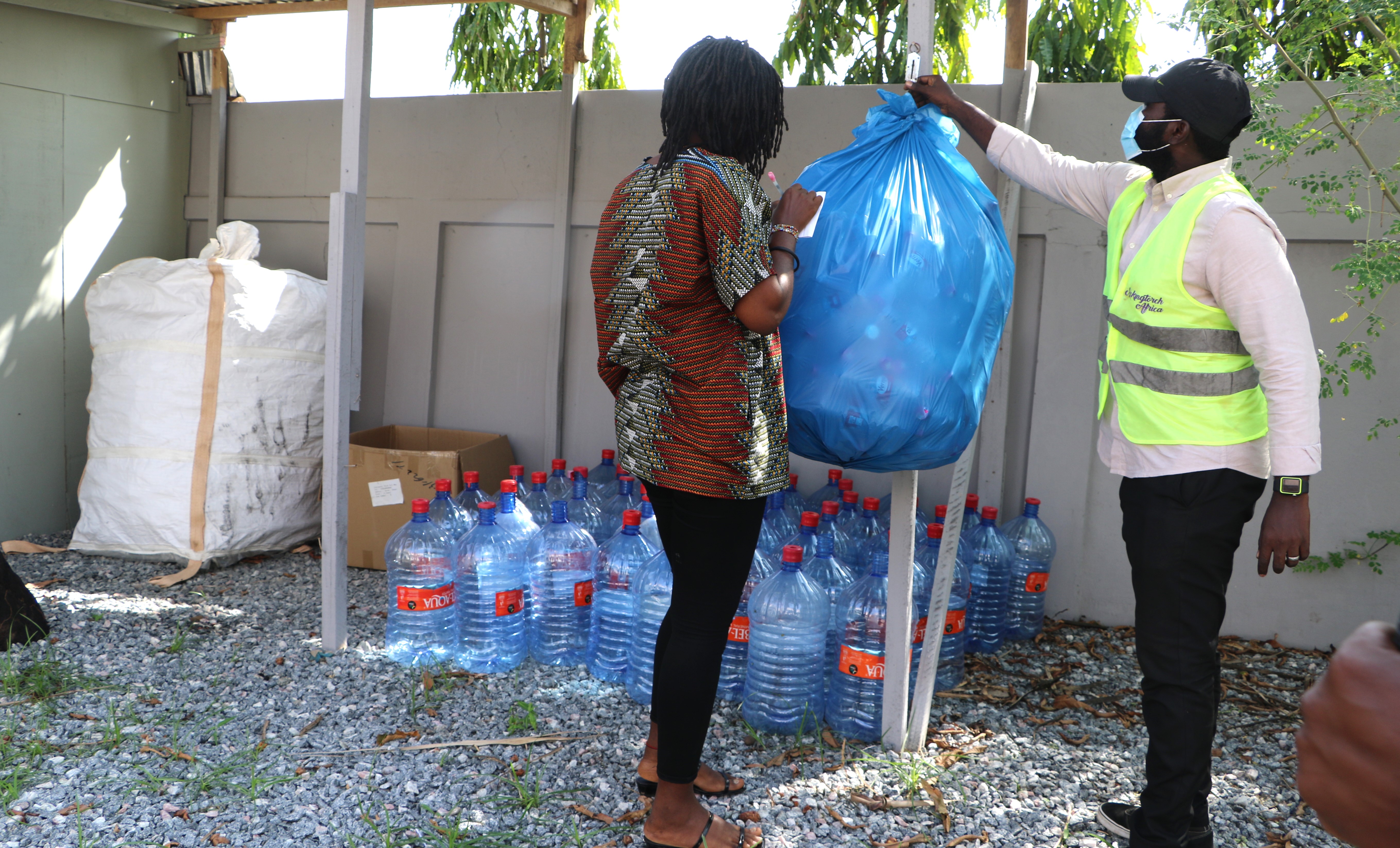By Catherine Adodoadji-Dogbe, Programme Analyst, UNDP Ghana
Steering the Course to a Zero Waste and Circular Economy
September 8, 2023

Waste segregation for recycling at Mckingtorch Africa, one of the winners of UNDP's Waste Innovation Challenge in Ghana.
Global waste generation is estimated to rise significantly, from 2.24 billion tonnes in 2020 to almost 3.88 billion tonnes by 2050. As we come together at the Africa Climate Week to chart a fresh course for climate action, addressing waste as part of climate discussions is critical. This is because waste significantly contributes to greenhouse gas emissions and provides an opportunity for reducing negative environmental impacts and mitigating climate change.
In Ghana, about 12,710 tonnes of solid waste is generated every day, with only 10 % collected and disposed of properly. Currently, 93% of waste in low-income countries is disposed of through open dumping and burning leading to air, water and soil pollution. It has also been the main cause of floods in major cities in Ghana.
Ghana has undertaken significant initiatives at the national level to address the surge in waste volumes. A Solid Waste Management strategy (SWM) has been formulated to set the country on a path towards progressive, high-quality, cost-effective, and sustainable waste management services which deliver environmental, public health, and economic benefits to all. The government has also developed a Circular Economy Roadmap and Action Plan as well as the National Action Roadmap to provide guidance on ways to manage plastics across the product lifecycle.
In supporting government efforts, the United Nations Development Programme (UNDP) plays a vital role in driving the pursuit of a zero waste and circular economy. Through its Zero Waste Offer, municipalities are supported to adopt integrated planning and programming for waste management. In collaboration with key stakeholders across the waste management value chain, UNDP in Ghana has established the Waste Recovery Platform with over 500 members to promote waste recovery in a larger circular economy context.
Achieving a zero waste and circular economy is key to creating jobs, conserving resources, and reducing greenhouse gas emissions. To harness these benefits, there are deliberate and systematic steps that need to be taken.
Inclusive and sustainable waste management governance
Enhancing inclusive and sustainable waste management governance in urban areas and cities is important in addressing key challenges associated with waste and catalyzing on the opportunities of waste as a resource. To do this, governments must develop inclusive governance systems through partnerships and capacity strengthening of stakeholders in the waste management sector. These actors can include the private sector, waste pickers as well as waste entrepreneurs. Active engagement of these various groups can lead to sustainable waste management practices. Further, establishing multi-stakeholder platforms like UNDPs flagship Waste Recovery platform, and the Ghana National Plastics Action Partnership (NPAP) provide the needed deliberative spaces to convene and work together with multiple stakeholders to take action towards achieving a zero waste and a circular economy.
Sustainable financing
Secondly, sustainable financing mechanisms will have to be established. This involves exploring alternate and innovative financing mechanisms, including private and public partnerships. Micro, Small, and Medium-sized waste management businesses operating in the sector can engage in joint ventures. Additionally, the implementation of the extended producer responsibility and the adoption of various tax mechanisms and differentiated waste tariffs could be considered.
Approximately $3.45 million is spent annually in Ghana to cover the expenses associated with waste collection and transportation for disposal. Similarly, about $290 million, an equivalent to 1.6% of Ghana's Gross Domestic Product is spent yearly to address issues related to indiscriminate waste disposal. Financing the waste sector would facilitate efficient waste management processes and the sharing of technological knowledge and expertise which could reduce these costs.
Sustainable production and consumption
Thirdly, it is crucial to advance sustainable production and consumption practices. A key objective is to detach economic growth from the generation of waste while advocating for sustainable ways of living. Building citizenry capacity to reduce and reuse resources, and where waste is created, to segregate and recycle, is essential. Additionally, leveraging indigenous knowledge and practices that lead to reduced waste production and the regeneration of nature is vital. Furthermore, there is the need to drive product innovation and rethinking by directing investments towards businesses and public initiatives positioned at the higher tiers of the waste hierarchy such as those engaged in waste prevention, redesigning, reuse, recycling, recovering and regeneration. Although these activities are often inadequately funded, they play a pivotal role in achieving a zero waste and circular economy.
To conclude, the achievement of a Zero Waste and Circular economy is crucial for addressing the Sustainable Development Goals (SDGs) particularly, goal 12 on sustainable production and consumption, goal 13 on climate action, goal 14 and 15, on life below water and on land respectively. The path to this transformative shift lies in redirecting our focus from linear resource consumption to circular and regenerative practices. Through efficient recycling, innovative product design, and collaborative partnerships across all levels of society, waste generation can be reduced, and resources conserved. This will create a harmonious balance for people and planet.

 Locations
Locations



